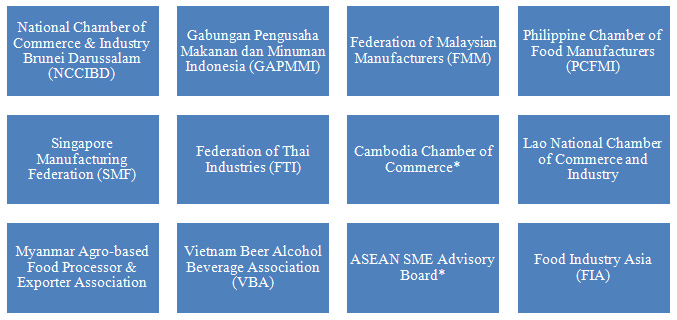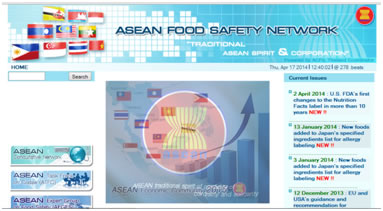Module 15: ASEAN Food Production and Supply
Table of Contents
Reading Text & Presentation
15.2 ASEAN cooperation in the food business
In the process of working toward the ASEAN Economic Community, some issues are identified, for example impact mitigation and adaptation of climate change to food, agriculture and forestry, sanitary and phytosanitary (SPS) measures that deal with human health and animal/ plant health/ diseases, and multi-sectoral cooperation on public health issues.
15.2.1 Food security, food handling, and food safety
The 3 major areas where coordination needs to be achieved:

1) Food security
< Process flow in the operation of the East Asia Emergency Rice Reserve Pilot Phase
EAERR comprises of both rice owned by ASEAN and their voluntary contributions. The rice stocks are stored at various locations in the region to ensure quick response and distribution, both as physical stocks and earmarked surpluses.
In response to the increase in food prices, the ASEAN Integrated Food Security (AIFS) Framework and Strategic Plan of Action on ASEAN Food Security (SPA-FS) were organized, endorsed by the 30th meeting of AMAF in Hanoi, Vietnam, on 23 October 2008. The key is to ensure long-term food security and to improve the livelihoods of farmers in the ASEAN region. The 14th ASEAN Summit was held on 26 February – 1 March 2009 in Cha-am/ Hua Hin, Thailand. Afterward, ASEAN adopted the AIFS Framework and SPA-FS and issued a statement. The leaders pledged to adopt food security as a high priority policy and to encourage partnership related to institutions and agencies, dialogue partners and international organizations. |
2) Food handling
< ASEAN Halal Logo |
3) Food safety
|
15.2.2 ASEAN Food and Beverage Alliance (AFBA)

AFBA website
(Source: http://afba.co/ retrieved 17/4/2014)
The association helps the private sector’s commitment and supports the AEC. Comprising national associations that are involved in the manufacture, distribution and sale of food and beverage products across ASEAN, AFBA strives to facilitate intra- and extra-regional trade.
The AEC has listed seven priority areas for food, agriculture and forestry which include
- strengthening food security;
- facilitating trade in agriculture and forestry products;
- generating and transferring technology to increase productivity and develop agri-business;
- developing rural communities and human resources;
- involving and investing in the private sector;
- managing and conserving natural resources for sustainable development; and
- strengthening ASEAN cooperation in addressing regional and international issues.
In April 2013, the ASEAN Food and Beverage Alliance (AFBA) was established under the Vision Declaration that was adopted by industry leaders at the Food Industry Summit in Jakarta in 2012. It is an affiliation of national associations and SME groups involved in the manufacture, distribution and sale of food and beverage products. The private sectors are formed as a vehicle to achieve the goals of the 2009-2015 Roadmap for an ASEAN Economic Community.
AFBA aims to achieve a single market in the priority integration sector of agri-food for the benefit of small, medium and large enterprises and their consumers in the market place. Through the AEC Blueprint, ASEAN Economic Ministers (AEMs) encourage businesses to tap into opportunities from free trade agreements and other schemes as well as helping to shape regional policies and providing feedback on implementation of the Blueprint.
Member Associations

There are various policy options available to address technical barriers. ASEAN is committed to supporting the free movement of goods primarily through the harmonization of members’ regulations, such as the acceptance of technical regulations and standards of other countries as equivalent to domestic regulations or standards.
In this regard, science-based international food regulations and standards play a crucial role concerning the safety and quality of agricultural commodities in order to protect consumers and to foster fair and open trade. There are several international bodies engaged in food standards at a global level that establish the global standards. In many areas, Mutual Recognition Agreements (MRAs), which have been successfully used in other priority integration areas, would constitute an effective first step towards harmonization for the ASEAN food business.
The agri-food sector is one of the priority sectors for ASEAN integration. As a member of the World Trade Organization (WTO), the WTO Sanitary and Phytosanitary (SPS) Agreement and Technical Barriers to Trade (TBT) Agreement both require ASEAN to apply national SPS and technical measures based on relevant international and national standards, guidelines and recommendations, and to adhere to basic obligations on transparency and non-discrimination. This contains a requirement that national technical regulations should not be trade-distorting, nor discriminate unfairly against third countries’ businesses or exporters.
The SPS Agreement is based on a risk assessment appropriate to the circumstances, using techniques developed by one of the three formally recognized international standard setting bodies, called the ‘Three Sisters’.

The Three Sisters
(Source: http://www.eria.org/ERIA-DP-2013-30.pdf retrieved 29/4/2014)
The TBT Agreement includes regulations, standards and testing and certification procedures in general that are not covered by the SPS, for example packaging and labelling aspects not related to food safety. Some regulations contain both elements, for example food safety provisions under SPS and quality or compositional requirements under TBT. The WTO requires members to notify changes to their regulations and standards and to provide sufficient time for other WTO members to submit comments to the national authority designated to handle the comments prior to the entry into force of a regulation.
Language Focus 15.2
Language Focus 3Language Focus 4
Activities
Activity 6Activity 7Activity 8
 The East Asia Emergency Rice Reserve (EAERR) and the ASEAN Food Security Information System (AFSIS) have been set up to standardize food security. These two projects are implemented according to the ASEAN ministers’ meeting on agriculture and forestry together with Plus Three countries (China, Japan and the Republic Korea), known as the AMAF+3 Mechanism.
The East Asia Emergency Rice Reserve (EAERR) and the ASEAN Food Security Information System (AFSIS) have been set up to standardize food security. These two projects are implemented according to the ASEAN ministers’ meeting on agriculture and forestry together with Plus Three countries (China, Japan and the Republic Korea), known as the AMAF+3 Mechanism.  highly concerned with production and handling of halal food, preparation of food and drink for Muslims, and Codex General Guidelines for the use of the term “Halal” are unified as a practical reference for the regional and international market. The proposed guidelines were approved by the Special SOM-AMAF, held in April 1998 in Phuket, Thailand and endorsed in the Twentieth Meeting of AMAF in September 1998 in Hanoi.
highly concerned with production and handling of halal food, preparation of food and drink for Muslims, and Codex General Guidelines for the use of the term “Halal” are unified as a practical reference for the regional and international market. The proposed guidelines were approved by the Special SOM-AMAF, held in April 1998 in Phuket, Thailand and endorsed in the Twentieth Meeting of AMAF in September 1998 in Hanoi.